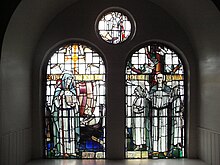St. Moluag
| Saint Moluag | |
|---|---|
 |
|
| Bishop of Lismore, Apostle of the Picts, Patron Saint of Argyll | |
| Born | c. 500–530 Ireland |
| Died | 592 Rosemarkie |
| Venerated in | Roman Catholic Church, Anglican Church |
| Major shrine | Isle of Lismore |
| Feast | 25 June |
| Patronage | Argyll; on Lewis invoked against madness |
Saint Moluag (c. 510–592; also known as Lua, Luan, Luanus, Lugaidh, Moloag, Molluog, Molua, Murlach, Malew) was a Scottish missionary, and a contemporary of Saint Columba, who evangelized the Picts of Scotland in the sixth century. Saint Moluag was the patron saint of Argyll as evidenced by a charter in 1544, from the Earl of Argyll, which states "in honour of God Omnipotent, the blessed Virgin, and Saint Moloc, our patron". The House of Lorne became the kings of Dalriada and eventually united with the Picts to become the kings of Scots. Moluag was patron saint of the kings of Dalriada, was the apostle of the Picts, so is highly likely to have been the first patron saint of Scotland.
Saint Lughaidh, better known by his pet name of Moluag, was an Irish noble of the Dál nAraide (one of the main tribes of the Ulaid in what is now called Ulster).
There are various Irish forms of the name, such as Lughaidh (or Lugaid), Luoc and Lua. Latinized they become Lugidus, Lugidius, Lugadius, Lugacius and Luanus. The name, as it has come down the centuries, Moluag or Moluoc, is made up of the honorific mo, plus the original name Lughaidh, pronounced Lua, plus the endearing suffix –oc. Other variants include Lugdach, Malew, Molonachus, Moloc and Molucus.
St. Moluag, the founder of over a hundred monasteries, was a bishop active during the period of the First Order of Celtic Saints and known as ‘The Clear and Brilliant, The Sun of Lismore in Alba’. The First Order were ‘most holy: shining like the sun’. This is a clear reference to his membership of the First Order.
MacDonald suggests that there must have been a Vitae of St. Moluag that is lost because of his prominent appearance in St. Bernard’s Life of Malachy. He writes ‘Further support for this occurs in the Life of Patrick by the Cistercian monk Jocelin of Furness written in circa 1185, where Mo-Luóc (“Lugacius”) is described as one of the six Irish priests whom Patrick prophesied would become bishops’. In a footnote he adds that the five other priests were Columbanus (Cólman), Meldanus (Mellán), Lugadius (Mo Lua), Cassanus (Cassán) and Creanus (Ciarán).
St. Moluag was born between 500 and 520. We know that he was a bishop in about 552 and that he ordained St. Comgal, his close kinsman, initially as a deacon then as a priest. Moluag persuaded St. Comgal to found Bangor Abbey, at Bangor, Ireland in modern-day Ulster.
...
Wikipedia
